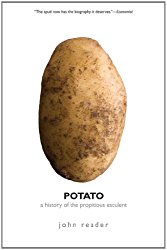
The potato—humble, lumpy, bland, familiar—is a decidedly unglamorous staple of the dinner table. Or is it? John Reader’s narrative on the role of the potato in world history suggests we may be underestimating this remarkable tuber. From domestication in Peru 8,000 years ago to its status today as the world’s fourth largest food crop, the potato has played a starring—or at least supporting—role in many chapters of human history. In this witty and engaging book, Reader opens our eyes to the power of the potato. Whether embraced as the solution to hunger or wielded as a weapon of exploitation, blamed for famine and death or recognized for spurring progress, the potato has often changed the course of human events. Reader focuses on sixteenth-century South America, where the indigenous potato enabled Spanish conquerors to feed thousands of conscripted native people; eighteenth-century Europe, where the nutrition-packed potato brought about a population explosion; and today’s global world, where the potato is an essential food source but also the world’s most chemically-dependent crop. Where potatoes have been adopted as a staple food, social change has always followed. It may be “just” a humble vegetable, John Reader shows, yet the history of the potato has been anything but dull.